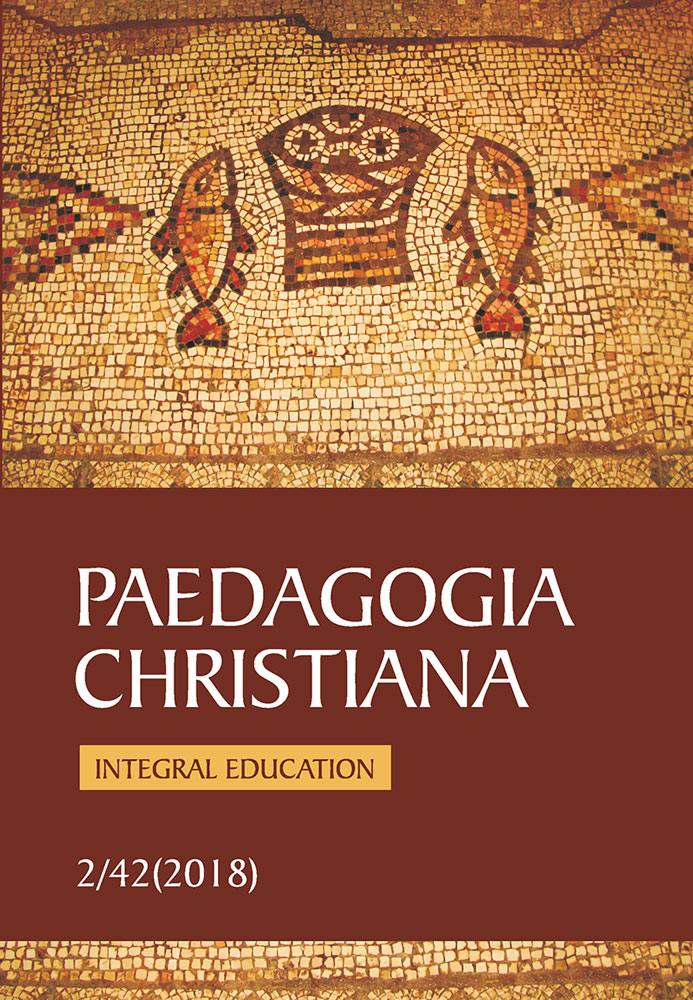Christian Faith as an Important Element of Culture and Integral Education
DOI:
https://doi.org/10.12775/PCh.2018.015Słowa kluczowe
wiara, rozum, chrześcijaństwo, integralność, kultura, integralne wychowanie, laickość, sekularyzm, istota i istotność wiaryAbstrakt
Wiara chrześcijańska jako istotny element kultury i integralnego wychowania
Artykuł nawiązując do słów Listu do Diogneta o chrześcijanach jako duszy świata, wskazuje na znaczenie wiary chrześcijańskiej i jej wyznawców – chrześcijan dla Europy i dla świata zwłaszcza w obszarze kultury i wychowania, które charakteryzują się podejściem integralnym. Tę problematykę analizuje się w następujących po sobie trzech etapach: 1) najpierw wskazuje się na integralność jako istotną cechę wiary i wychowania chrześcijańskiego zaznaczającą się wyraźnie już od samych początków chrześcijaństwa; 2) ukazuje wiarę jako podstawowy wyraz ludzkiej tożsamości, zgodny także z wolnością, która nadaje jej tożsamości; 3) poddaje krytycznej analizie laickość, wskazując w tym kontekście na potrzebę promowania integralności wychowania osoby oraz na kulturowe i społeczne korzyści, jakie zdolna jest wnosić wiara chrześcijańska. Zwłaszcza w obecnej utracie zdolności rozróżniania rzeczy ważnych i mniej ważnych, gdy obok potrzeby przemyślenia idei laickości wskazuje się na możliwości pozytywnego jej zwieńczenia, wiara chrześcijańska może stanowić istotny element integralnej kultury i integralnego wychowania w działaniu na rzecz humanizacji. W tym działaniu rozum i wiara, jako „dwa skrzydła”, mogą prowadzić do prawdziwej mądrości.
Bibliografia
Aristotele. Metafisica. Milano: Bur, 2009.
Arnobio il Retore. Contro i pagani. Roma: Città Nuova, 2017.
Benedetto XVI. “Caritas in veritate”. https://w2.vatican.va/content/benedict-xvi/it/encyclicals/documents/hf_ben-xvi_enc_20090629_caritas-in-veritate.html [access: 18.10.2018]
Benedetto XVI. “Discorso all’Università di Regensburg”. http://w2.vatican.va/content/benedict-xvi/it/speeches/2006/september/documents/hf_ben-xvi_spe_20060912_university-regensburg.html [access: 18.10.2018].
Clemente di Alessandria. Gli Stromati. Note di vera filosofia. Milano, Edizioni Paoline, 2006.
Dodds, Eric R. Pagani e cristiani in un’epoca di angoscia. Firenze: La Nuova Italia, 1988.
John Paul II. Ecclesia in Europa. http://w2.vatican.va/content/john-paul-ii/en/apost_exhortations/documents/hf_jp-ii_exh_20030628_ecclesia-in-europa.html [access: 18.10.2018].
John Paul II. “Fides et ratio”. https://w2.vatican.va/content/john-paul-ii/en/encyclicals/documents/hf_jp-ii_enc_14091998_fides-et-ratio.html [access: 18.10.2018].
Habermas, Jürgen. “I fondamenti morali prepolitici dello Stato liberale”. In: Joseph Ratzinger, Jürgen Habermas, Etica, religione e Stato liberale. Brescia: Queriniana, 2005.
Ireneo di Lione. Contro le eresie. Siena: Cantagalli, 1968.
Platon. La Repubblica. Roma: Laterza, 1997.
Ratzinger, Joseph. Europa. Milano: San Paolo, 2004.
The Letter to Diognetus. http://www.vatican.va/spirit/documents/spirit_20010522_diogneto_en.html [access: 18.10.2018].
Tommaso d’Aquino. Somma teologica. Napoli: Libreria Scientifica Editrice, 1965.
Volney, Constantin-François. “Solution du problème des contradictions”. In: La laicité en mémoire, eds. Guy Gauthier, Claude Nicolet. Paris: Edilig, 1987.
Pobrania
Opublikowane
Jak cytować
Numer
Dział
Statystyki
Liczba wyświetleń i pobrań: 821
Liczba cytowań: 0



